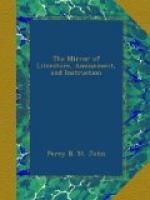“The money of England (says Chamberlayne) was abused and falsified for a long time; till Queen Elizabeth, in the year 1560, to her great praise, called in all such money; since which time, no base money hath been coined in the Mint of England, but only of pure gold and silver, called sterling money; only of latter time, in relation to the necessity of the poor, and exchange of great money, a small piece of copper, called a farthing, or fourth part of a penny, hath been permitted to be coined; and so likewise an halfpenny of two farthings.”
Penny pieces of copper were first issued in England June 26, 1797.
N.B. This is a penny article, but it is hoped the reader will not object to pay twopence for it.
P.T.W.
[2] Derived from pecunia.
* * * * *
ORIGIN OF BAIL.
(For the Mirror.)
“Worry’d with debts, and past
all hopes of bail,
The unpity’d wretch lies rotting
in a jail.”
Roscommon.
The system of giving securities, or bail, to answer an accusation, is a custom (says Brewer) which appears to have been coeval with the Saxon nation. This system was, indeed, subsequently carried by the Saxons to a burthensome and degrading height—not being confined to those who were accused of crime, but extending to the whole community, who thus gave surety to answer anticipated criminality. This object was effected by the division of England into counties, hundreds, and tithings, and by the direction that every man should belong to some tithing or hundred; which divisions were pledged to the preservation of the public peace, and were answerable for the conduct of their inhabitants.
The system of placing all the people under borh, or bail, the origin of which was attributed to Alfred, is first clearly enforced in the laws of Edgar.
P.T.W.
* * * * *
ANCIENT DIVISIONS OF THE DAY.
(For the Mirror.)
“See the minutes how they run:
How many makes the hour full compleat,
How many hours bring about the day,
How many days will finish up the year,
How many years a mortal man may live.”
Shakspeare.
The Chaldaeans, Syrians, Persians, and Indians began the day at sun-rise, and divided both the day and night into four parts. This division of the day into quarters was in use long before the invention of hours.
The Chinese, who begin their day at midnight, and reckon to the midnight following, divide this interval into twelve hours, each equal to two of ours, and distinguished by a name and particular figure.
In Egypt the day was divided into unequal hours. The clock invented by Ctesibius, of Alexandria, 136 years B.C. was so contrived as to lengthen or shorten the hours.




